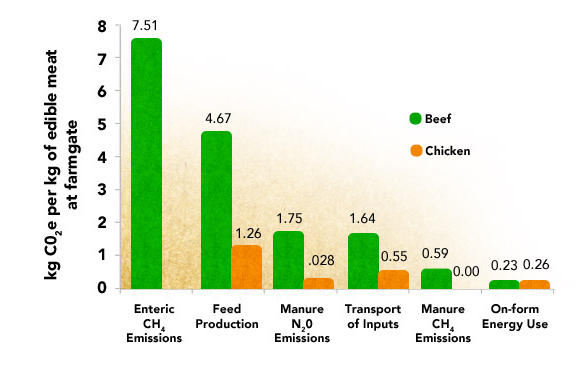Sustainable Beef?
As an environmentalist, or someone who cares about the environment; I understand that eating red meat is unsustainable. But as an athlete who grew up needing protein, I really enjoy eating red meat. So there’s this internal debate in my head with enjoying a steak and being environmentally friendly.
The Environmental Working Group (EWG) shows the full lifecycle greenhouse gas emissions from different types of proteins. As shown in the graph; lamb, beef, cheese, and pork emit the most greenhouse gases.
We learned in class that McDonald’s aims to purchase verified sustainable beef by 2016. But what does that really entail? Why is beef unsustainable?
Feed production and manure both contribute to greenhouse gas emissions. Most livestock are fed fishmeal, corn, soybean meal and other grains. Grains in particular require fertilizer, which when applied to soil, creates nitrous oxide (N₂O). N₂O has 300 times the warming effect that carbon dioxide does (Environmental Working Group, 2011). Manure also releases N₂O and methane which pollutes our water and air. The Environmental Working Group (2011) states that 90% of beef’s emissions occur during the production process as seen in the graph below.
Another reason that beef is generally unsustainable is that a lot of the animal is wasted when we consume beef. However I can’t see McDonald’s customers wanting every part of a cow in their burger. McDonald’s has already experienced a lot of backlash in regards to what their food is made of.
I personally think that it’s great that McDonald’s is aiming to purchase sustainable beef by 2016. Switching to sustainable options within their wheelhouse of product offerings is a smart choice by McDonald’s. But the issue here is that not many consumers know that beef is unsustainable. Whose job is it to educate these consumers? As soon as a consumer thinks that a campaign can benefit the company directly they will have negative feelings towards the company. If McDonald’s starts to educate consumers about the negative impacts of consuming beef; will consumers believe it is a marketing ploy to gain a competitive advantage over other fast food chains? Doing good for the environment and good for your company seems to be a double edged sword in the opinion of consumers these days.
http://www.ewg.org/meateatersguide/a-meat-eaters-guide-to-climate-change-health-what-you-eat-matters/climate-and-environmental-impacts/
http://www.aboutmcdonalds.com/mcd/sustainability/signature_programs/beef-sustainability.html



Great start to sustainability marketing blogging, Kristen. Try hyperlinking the graph to the source to save you from having to list the website at the end. Also, can you apply any of the frameworks from class/readings so far to round out your thinking?
Looking forward to reading your ideas this term.
Tamar
The external information you draw here is really great to see. It’s one thing to talk about why beef is unsustainable, but you’ve incorporated graphs and statistics to show exactly how bad it is compared to other animals. Making the argument a graphic one immediately makes me understand the debate about sustainable beef, and how it applies to my current eating habits.
To go further in depth I would ask: what do you think sustainable beef actually is? And, building on that, how do you think McDonalds should go about marketing their campaign so consumers don’t think it’s just a ploy?
Hey Sam
I, along with McDonalds, am currently unaware of what sustainable beef is. I think it would have something to due with the agricultural practices involved. I know manure is very GHG intensive, in addition to the feed aspects. Looking at the full LCA of beef (including transportation) is going to be important because farms in New Zealand are currently doing a lot better environmentally. Many people will think it is a ploy, but I think that the partnerships that McDonalds has made in addition to making sure they are very transparent in what they do is going to be important.
Hi Kristen,
I was curious about McDonald’s sustainable beef initiative after reading your interesting blog post, I went to the McDonald link you provided to read more about it. It’s great that they have worked with WWF to develop a Global Roundtable Sustainable Beef program, and also many other programs/conferences with efforts to create action plans, including educating farmers with sustainable beef practices. I was hoping that they would provide more information about what a sustainable beef program entails so that the public can also learn more about it, however, I understand that it could have a counter effect when people are more educated of the very unsustainable beef industry where McDonald is a large player in.
Ly
Hi Ly – I hope that they release more information too. I think that they are unsure of how they are going to define sustainable beef at the moment. Hopefully when they come up with more information they will share it to the public.
Hey Kristen,
Great post! I’ve often faced the same dilemma between enjoying a steak/getting enough protein and knowing that it is an unsustainable diet. I think part of the problem for many people, myself included, is not having more than the basic knowledge of nutrition and so we don’t know there are nutritional and protein-rich substitutes for steak. Maybe the best marketing route, for companies like MacDonald’s, is to provide education in nutrition while promoting protein and nutrient rich substitutes. Shifting your focus to promotion of a wider product range with red meat alternatives may have a more positive response than just condemning the red meat products you already have.
Hi Connor – I think that this is my problem too, I don’t know how to cook vegetarian or protein substitutes. Although that’s a great idea, I feel like McDonalds is known for their burger and shifting away from the Big Mac or Quarter Pounder would be changing their brand completely.